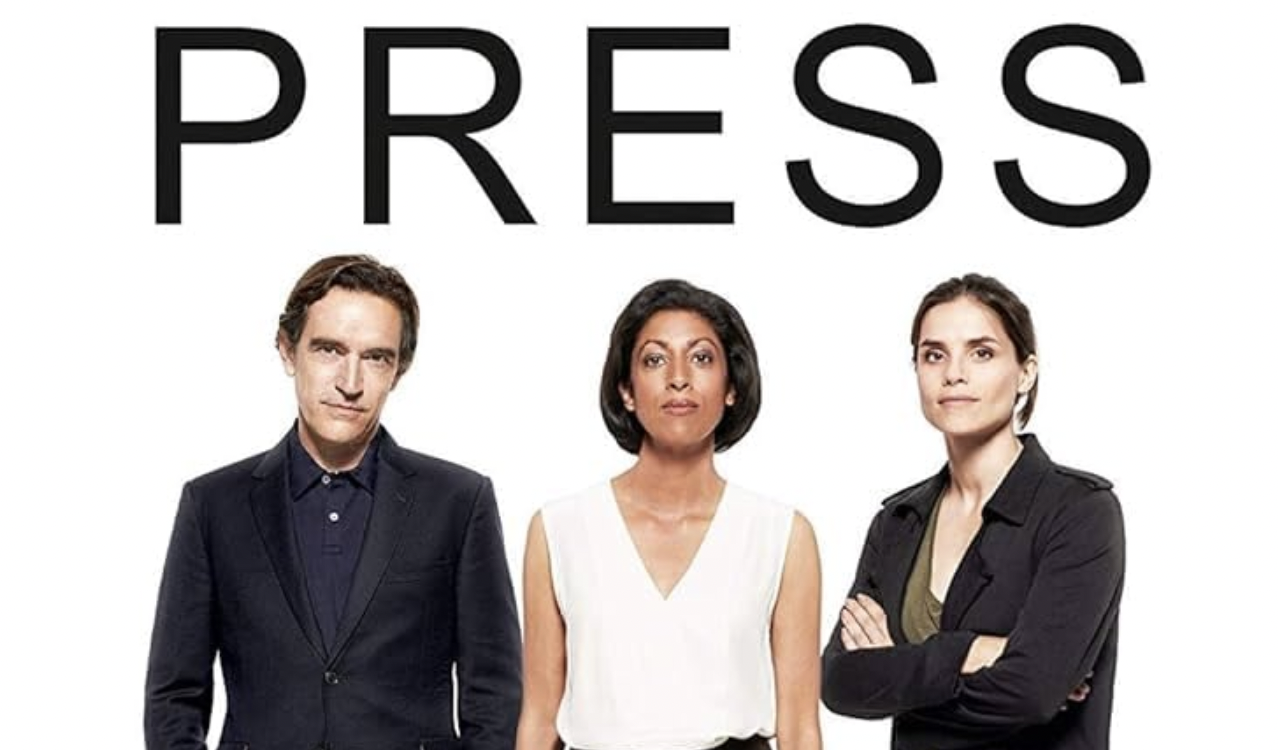Best Series You Never Binge Watched
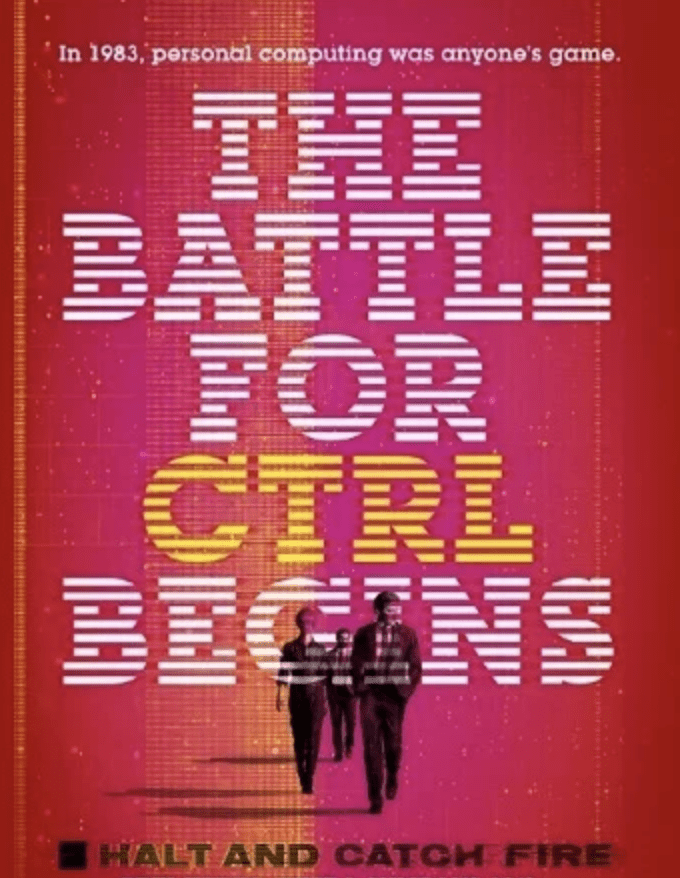
Best Series You Have Never Binge Watched is Halt & Catch Fire
Halt & Cath Fire is based in the early 1980s, and the spirit of innovation in personal computing is about to catch fire. Hot on the trail is a renegade trio — a visionary, an engineer and a prodigy — who risk everything to realize their vision of building a computer that can change the future.
Halt and Catch Fire’s cast represents the typical silicon valley personas with each being successful (more or less comfortably while pursuing other ventures) but they never quite strike it big. Sometimes that’s a result of conflict between the partners, technological limitation, or, most often, the presence of an enormous corporation capable of choking the market and stifling innovation.
Just after IBM corners the market with its flagship PC, a flaw is discovered in its operation, opening the door for competition. In steps Joe MacMillan, a former IBM executive who now works for Cardiff Electric. MacMillan plans to reverse-engineer IBM’s technology, putting Cardiff in the thick of the personal computer race. He enlists the help of engineer Gordon Clark, who dreams of creating a revolutionary computer, and Cameron Howe, a volatile prodigy who puts her future on the line to join MacMillan’s rogue project.
Halt and Catch Fire kept its focus squarely on the haze of an emerging field, without any of the fist-pumping moments that might have come from a show focusing on the rise of Google, Facebook or Twitter. The characters never achieved lasting success or transformation, perpetually stymied by the behemoth enterprise players in a nascent and clunking industry that bought or squashed change or creativity. Instead, they faced an endless, thankless series of intractable workplace decisions about integrity, product quality and business logistics.
Over the course of the series, business interests range from building personal computers at Dell competitor Cardiff Electric to video games, web-based chat, and e-commerce (Mutiny to antivirus software at MacMillan Utility to, finally, early search engines at Comet and Rover). All of these companies are fictional and most are founded by the characters themselves.
The early days of Halt and Catch Fire are packed with archetypal Silicon Valley figures like Joe MacMillan (Lee Pace), a salesman-cum-confidence man who looks and sounds like a venture capitalist pitch in human form, full of the arrogance that would come to define the tech industry’s charismatic, self-styled geniuses. The real creators of vision and code, however, are the nebbish Gordon Clark (Scoot McNairy), his long-suffering wife Donna Clark (Kerry Bishé), and Cameron Howe (Mackenzie Davis), the punk prodigy who can see into the future of machines like an modern-day oracle. If Joe is Steve Jobs, conducting every conversation like an Apple keynote address, then Cameron is the woman with a bleached blond pixie cut throwing a sledgehammer in its “1984” commercial as the men around her watch, their mouths agape.
Best Series You Have Never Binge Watched is Halt & Catch Fire Season 1
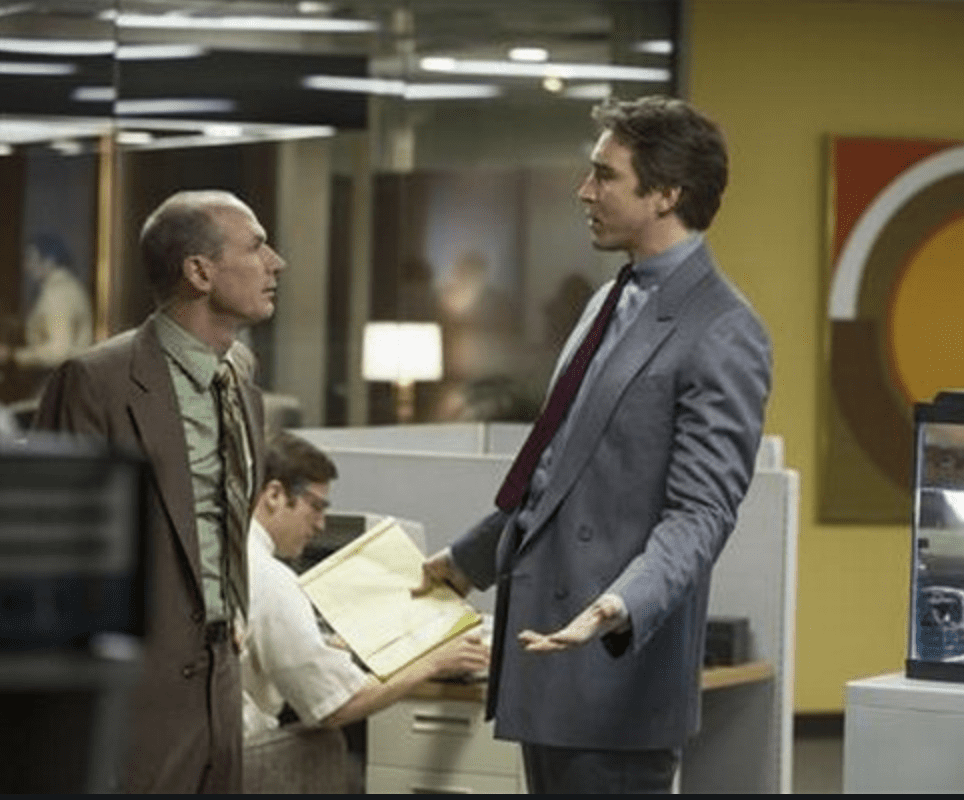
Halt & Catch Fire Season 1
In season one, the company Cardiff Electric makes its first foray into personal computing, with entrepreneur Joe MacMillan (Lee Pace) running a project to build an IBM PC clone with the help of computer engineer Gordon Clark (Scoot McNairy) and prodigy programmer Cameron Howe (Mackenzie Davis).
Joe MacMillan (Lee Pace), a mystery man from back East, arrived in Texas with a scheme to maneuver a small electronics company into manufacturing an IBM PC rip off. The plan eventually drew in Cameron, as well as Gordon Clark (Scoot McNairy), an engineer whose dreams were crushed years before with the unsuccessful launch of a computer he designed with his wife, Donna (Kerry Bishé).
In 1983, former IBM sales executive Joe MacMillan joins Cardiff Electric, a Dallas-based mainframe software company. There, he enlists the help of computer engineer Gordon Clark to reverse engineer an IBM PC and reconstruct the assembly language code of its BIOS. Company owner Nathan Cardiff and vice president John Bosworth confront the two when the company is sued by IBM for copyright infringement. After Joe reveals that he told IBM about the project, Cardiff Electric is forced to legitimize it and enter the personal computing business.
Needing a software engineer to write the BIOS for their IBM clone, Joe recruits prodigy college student Cameron Howe to join Cardiff. Joe heads the PC project, with Gordon leading the hardware team and Cameron writing the BIOS in a “clean room”. Joe’s goal for the PC is to be twice the speed at half the cost of IBM’s PC, but much of the company does not buy into his vision or trust him. He further alienates himself from Cardiff and Bosworth by upsetting a potential investor and causing IBM to respond to the project with aggressive undercutting, luring away two-thirds of Cardiff Electric’s clients, resulting in layoffs.
Best Series You Have Never Binge Watched is Halt & Catch Fire Season 2
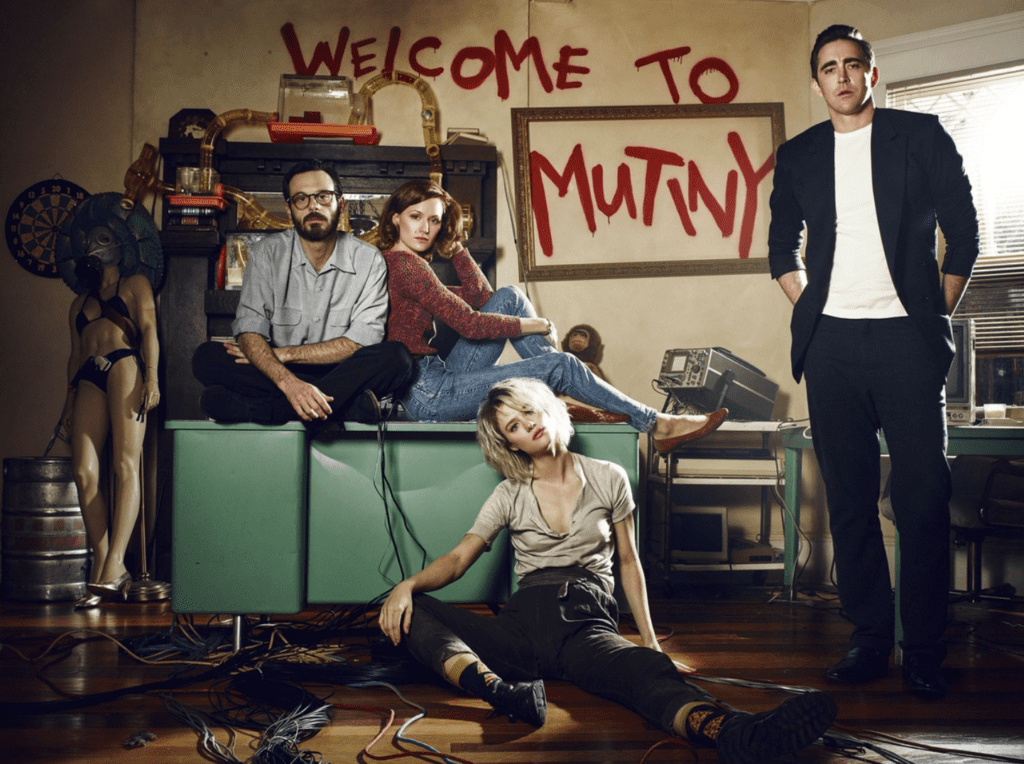
Halt & Catch Fire Season 2
By season two, the character focus shifts. Donna and Cameron launched an online gaming company, Mutiny, in the process discovering — as they noticed the service’s chat rooms buzzing with activity — that Mutiny’s real product was community. Net, Mutiny is a gaming platform that Donna also identified as an early social network.
After releasing two models of the Giant, Cardiff Electric is sold to a conglomerate in 1985, earning Gordon a six-figure settlement, but Joe nothing. Ready to move on from his past, Joe gets engaged to his girlfriend Sara and goes to work at Westgroup Energy, an oil magnate where her father, Jacob Wheeler, is CEO. Starting in data entry, Joe spots an opportunity to use the company’s mainframe computers for time-sharing.
To make up for his mistake, Gordon makes an arrangement with Joe for Mutiny to be Westgroup’s first time-sharing client at a discounted rate in exchange for Gordon configuring the mainframes. With a stable network, Mutiny thrives, due in part to their new “Community” chat rooms conceived by Donna. Preoccupied with work, Donna keeps an abortion secret from Gordon, while he hides his toxic encephalopathy diagnosis from her.
Asked by Jacob to secure more lucrative time-sharing terms, Joe raises Mutiny’s rates. Cameron is upset, but Donna and Joe negotiate a compromised rate based on Mutiny meeting benchmarks. One of them is porting their software to the AT&T Unix PC, which they unsuccessfully fake during a demo for Joe. Impressed by their innovation of transmitting data over coaxial cable, Joe convinces Jacob to make an acquisition offer to Mutiny. Cameron declines it after being dissuaded by Joe, who believes Jacob would corrupt the startup’s vision. Joe decides to quit Westgroup and after marrying Sara, plans to move them to California.
Gordon writes Joe an antivirus program in hopes of helping Westgroup, but Joe uses it instead to pitch a venture capitalist. He invites Gordon to join him in the endeavor but is refused. Gordon is furious to learn that Joe has received $10 million in funding for a new company in the San Francisco Bay Area, MacMillan Utility. Having transitioned from games to an online community, Mutiny departs for California.
Best Series You Have Never Binge Watched is Halt & Catch Fire Season 3
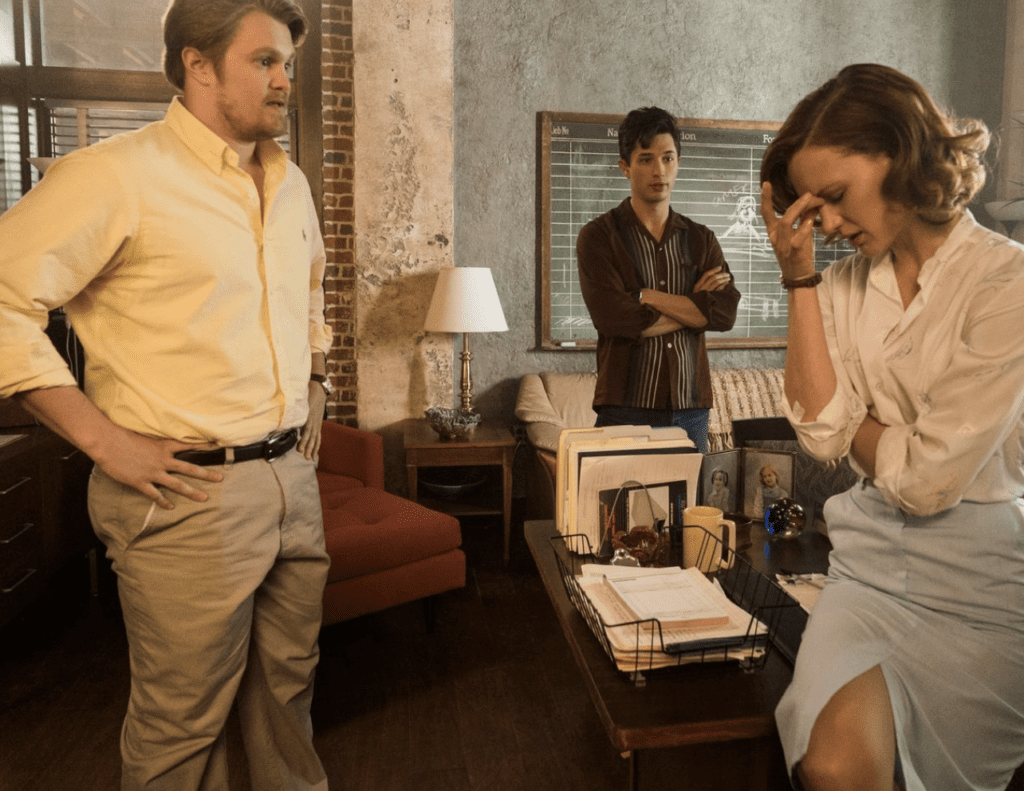
Halt & Catch Fire Season 3
By season three, which moves the action to San Francisco, that sputters as Donna pushes them to monetize the company.
In 1986, Mutiny celebrates 100,000 users and the launch of its mainframe. Gordon is involved in a copyright infringement lawsuit against Joe. After noticing that Mutiny’s chat feature is facilitating user-to-user transactions, Donna and Cameron are inspired to build an online trading feature and begin pitching venture capitalists. One of them, Diane Gould, helps them acquire a competitor, Swap Meet. An under-appreciated Mutiny programmer, Ryan Ray, quits, and after being inspired by Joe’s presentation of MacMillan Utility’s no-cost antivirus software, Citadel, he convinces Joe to hire him.
The Swap Meet–Mutiny merger causes friction, as Cameron is resistant to making her code compatible with Swap Meet’s and wants to fire their founders. Ryan is disconcerted to learn MacMillan Utility plans to charge users for Citadel. To keep it free, Joe enlists Ray in a special project to find another revenue stream. Ryan maps the ARPANET, an early predecessor to the Internet. Studying the map, they see potential in NSFNET, a backbone network not yet approved for commercial use. The two build their own regional network at MacMillan Utility, but after spending millions of the company’s money and making a handshake deal with the NSFNET in defiance of the company’s board of directors, Joe is stripped of his executive powers. As a result, he declares in a deposition that Citadel was stolen from Gordon.
Best Series You Have Never Binge Watched is Halt & Catch Fire Season 4

Halt & Catch Fire Season 4
By season four, Cameron & Donna are estranged — their conflicting versions of ambition having become untenable — but Donna sits in her gorgeous house quietly playing Cameron’s virtually unbeatable game, Pilgrim, nearing some understanding of her former friend and colleague. It’s not until the finale that audiences truly see them reconcile, standing in the empty space that used to be Mutiny and dreaming up the shell of a new idea, Phoenix.
Over three years, Gordon and Joe run the internet service provider (ISP) CalNect, and Joe logs website URLs. Working from Japan, Cameron fails to complete a web browser for them before they are beaten to market by Mosaic. When CalNect’s backbone provider MCI declines to offer them more bandwidth, Gordon and Joe realize MCI is forming its own ISP and sell CalNect.
Joe and Cameron receive a beta copy of the yet-to-be released browser Netscape Navigator. They discover a link to Yahoo on its toolbar as the default search provider and realize that Comet is doomed. Joe sells Comet, and AGGEK sells Rover’s algorithm. Diane retires and is succeeded at the firm by Donna, who renames it “Symphonic Ventures” and fosters a relaxed, inclusive work culture. Cameron ends her professional relationship with Alexa.
Comet and Rover were always going to end because this show exists in our real lived history, and there was never any way around Netscape launching with Yahoo built into its browser toolbar. Halt and Catch Fire was always going to end because it’s one of those shows that existed on the bubble forever, perpetually tilting on the edge of cancellation. TV shows and tech startups are alike that way.
What to Binge Watch on Netflix >>

